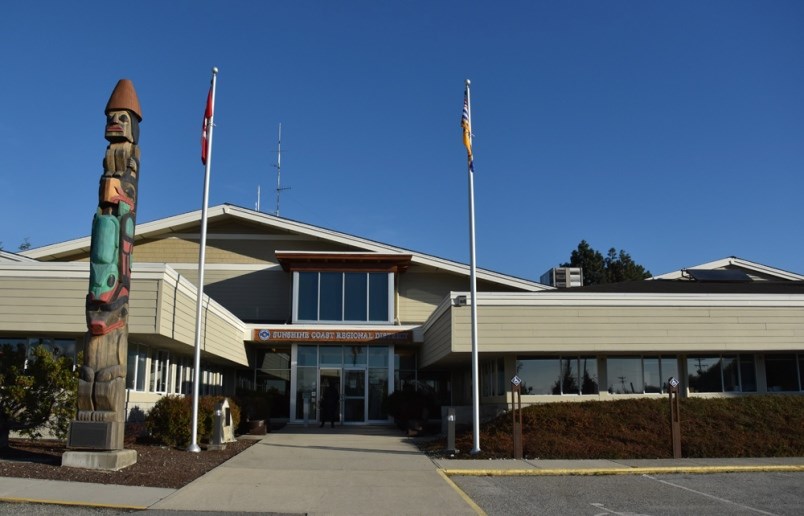The directors answered that the SCRD board is dealing with complications of the pandemic, mandatory safety requirements, deferred maintenance projects, higher environmental regulations and increasing costs for construction, labour and fuel.
“Pretty much everything is costing us more,” Elphinstone director Donna McMahon said in the Feb. 26 session.
In presentations on Feb. 22 and 26, the rural area directors for Halfmoon Bay, Egmont/Pender Harbour, Roberts Creek, Elphinstone and West Howe Sound hosted virtual information sessions about the year’s budget. The directors used many of the same slides for all of the meetings; what differed were the presenting directors and the questions they were asked by residents. McMahon also added a pop quiz to her presentation to keep attendees interested.
Proposed taxation increases vary since they are relative to the area, property assessment and what services a taxpayer is receiving. After Round 1, the estimated increase ranges from 17.43 to 23.44 per cent in rural areas.
There are currently 226 projects included in the 2021 SCRD budget, 117 of which are new projects while 109 have been carried forward. In 2020, the SCRD budget increase was reduced to 4.7 per cent to accommodate the toll of COVID-19 on the economy.
Dean McKinley was asked how he feels, as chief administrative officer, about the more than 200 projects on the district’s list.
“It’s daunting,” McKinley said. “It’s an aggressive work plan. A lot of this, we can’t avoid it. A whole bunch of the projects that are on this list are things we have to do. Maybe we should have started them sooner, maybe that would have been a good idea, but we’re faced with it now. It means that we have a tremendous amount of pressure to do what would typically be determined to be day-to-day operations in challenging circumstances.”
He said the SCRD is trying to staff up and partner with others to deal with the workload, calling it a huge challenge.
When Area B director Lori Pratt was asked why the SCRD is “afraid of raising taxes,” she said the board needs to be cognizant that there are homeowners who cannot afford to pay for their home and the associated taxes, but there are projects that need to move forward.
“We need to be prudent in how we’re doing it. It’s interesting, because I’m also hearing on the other side that we should be keeping our taxes low,” she said. “We can’t just be raising taxes because homes are valued at a million dollars or more. There’s more to our community than that, there are a number of people … who are just scraping by.”
In the Area A presentation, director Leonard Lee said there are options for seniors and some residents to defer their tax payments and utility bills if they cannot afford them or need more time to pay.
On Feb. 26, directors McMahon of Area E, Andreas Tize of Area D and Mark Hiltz of Area F hosted a joint information session for their residents.
They were asked if the SCRD had looked at eliminating services and programs rather than adding more during the pandemic. The directors said that it is difficult to reduce or take away such services, like the pool, because there are outspoken groups in support of each service.
Hiltz said the staff and board are trying to create a sustainable budget going forward, but need to address the services and infrastructure that weren’t maintained in the past while keeping an eye on future needs.
“I think right now we are in this rebuilding of the foundation, catching up from the past, preparing for the present and then leading to the future,” Hiltz said. “That’s why things are not being reduced. There’s an ongoing demand from the public because we all like to live here. For me, this is the cost of living in a beautiful place like the Sunshine Coast.”
In the Area B information session, an attendee asked why there was an increase in costs for recreational services despite the reduction of services offered during the pandemic.
In response, CAO McKinley said, “Even when we were closed to the public during the start of the pandemic, we still had to keep staff there to have the buildings operational… When we did reopen the facilities there [were] heightened requirements for cleaning, for staffing – essentially, it cost a lot more to provide less service.”
Bylaw enforcement was one of the topics director Lee was asked to address. He said they intend to hire support for bylaw services, and consider it a fairly high priority to address before the summer, when short-term rentals and potential noise is anticipated.
Other questions looked toward the future, with one participant asking Lee what property taxes in the near future will look like and if this year’s increase can be considered a “big bang” or the beginning of a series of more increases.
“Yes, there will be tax increases in the future over and above the cost of living,” Lee said. “I’m hoping it’s nothing like this year… We all like our pools, we all like our fire departments to be well equipped, we need the water there all the time. Those things are what I believe people would consider essential. That’s what’s driving our budget this year, and that’s what will be driving our budget next year.”
Round 2 is scheduled for March 4 and 5, and the final plan is expected to be adopted at the March 25 SCRD board meeting. A frequently asked question guide will be uploaded to the SCRD website.



